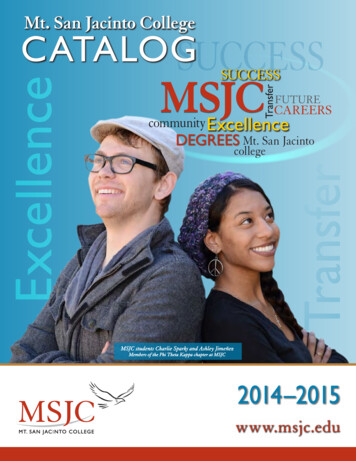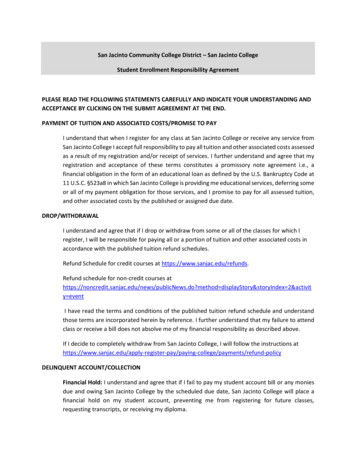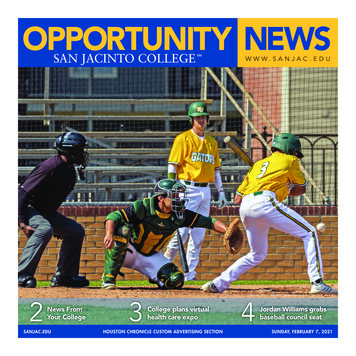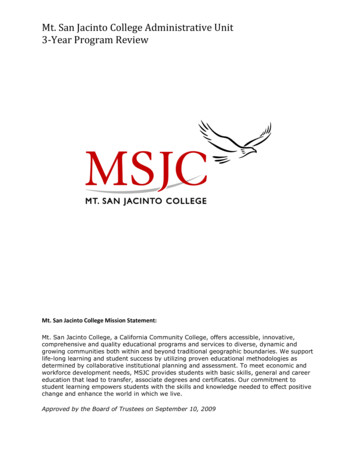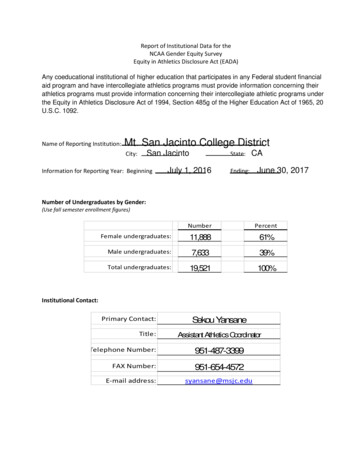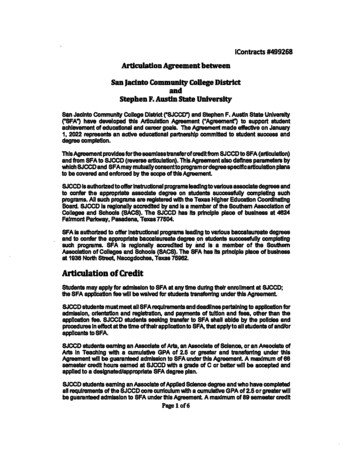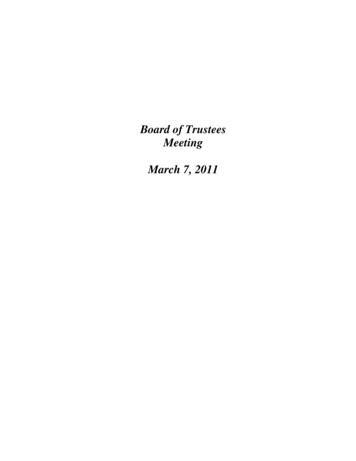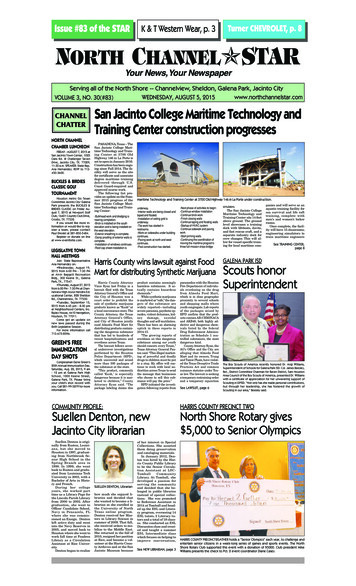
Transcription
San Jacinto CommunityCollege Districtwww.sanjac.eduEducational (Academic) ProgramsEducational(Academic)Programs63
Educational (Academic) ProgramsSelection ofCatalog andCampusCatalog Selectionfor GraduationEducational (Academic) ProgramsA student becomes eligible to graduateby completing the degree and/or certificaterequirements as set forth in the San JacintoCommunity College District Catalog. Thesegraduation requirements change periodically to meet the various needs of transferuniversities, business and industry (employers) and/or cancellation of courses andprograms. The guidelines listed below havebeen established to assist students in identifying the specific requirements which applyto their chosen program of study.San Jacinto College expects that a studentwill normally graduate under the catalogin effect at the time of the most recent admission. For nursing and other specializedprograms, the term of acceptance into theprogram determines the catalog year. Whenthe elapsed time from initial enrollmentto program completion is long, individualcourses may have been replaced or canceled.Counselors will assist students in the selection of appropriate courses. Studentsmay consult the new catalog each year toconfirm whether their chosen program hasbeen revised or will be replaced or if a newprogram has been introduced which may bemore appropriate for meeting their education objectives.Students may request graduation underthe program requirements of any catalogin effect during their latest period of continuous enrollment, as long as the programremains approved by the Texas Higher Education Coordinating Board. Continuousenrollment is defined as missing no morethan one Fall or Spring term at the timeof application for graduation. Studentsshould consider the number of unmetcourses remaining to be completed in selecting a catalog.64www.sanjac.eduCampus Selectionfor GraduationStudents may choose to graduate from thecampus of their choice provided:1. The student has completed course workat the campus chosen.2. The campus offers the program in whichthe degree or certificate is sought.Students who have not completed allcourse requirements, but have completedthe residency requirements for a degree fromSan Jacinto College may fulfill their courserequirements at another regionally accredited institution and transfer the credits toSan Jacinto College. The applicable catalogfor graduation will be in accordance withthe provisions listed above.Students whose technical program hasbeen discontinued by the College will beprovided an opportunity to graduate under a catalog in accordance with the aboveprovisions, provided their graduation datesare within the time period in which the College is authorized by the state to award thedegree. Students whose technical programsare discontinued on one campus, but arecontinued on another campus, are expectedto complete their programs on anothercampus or they may attempt to earn otherdegrees.CoreCurriculumTexas law mandates that all state-supported colleges and universities have a corecurriculum consisting of at least 42 hoursthat will automatically transfer to all Texaspublic colleges and universities. Embedded within the 42-hour core curriculumare general education student learningoutcomes signifying what students learnby earning an A.A. or A.S. degree. Embedded in technical programs, leading toan A.A.S. degree, are 15 hours of generaleducation drawn from courses found in thecore curriculum. General education studentlearning outcomes represent the basic intellectual competencies outlined by the TexasHigher Education Coordinating Board.They include the following:READING: Reading at the college levelmeans the ability to analyze and interpret avariety of printed materials.WRITING: Competency/outcome in writingis the ability to produce clear, correct andcoherent prose adapted to purpose, occasion, and audience.SPEAKING: Competence in speaking is theability to communicate orally in clear, coherent, and persuasive language appropriate to purpose, occasion, and audience.LISTENING: Listening at the college levelmeans the ability to analyze and interpretvarious forms of spoken communication.CRITICAL THINKING: Critical thinkingembraces methods for applying both qualitative and quantitative skills analyticallyand creatively to subject matter in orderto evaluate arguments and to constructalternative strategies.COMPUTER LITERACY: Computer literacyat the college level means the ability to usecomputer-based technology in communicating, solving programs, and acquiringinformation.
Educational (Academic) ProgramsIf a student successfully completes SanJacinto College’s 43-hour core curriculum,that block of courses must be substitutedfor the receiving institution’s core curriculum. A student may not be required to takeadditional core curriculum courses unlessthe Texas Higher Education CoordinatingBoard has approved a larger core for thereceiving institution. Students who transfer without completing the core curriculumshall receive academic credit in the corecurriculum of the receiving institution foreach of the courses that the student has successfully completed in the San Jacinto College core curriculum.TransferProgramsCounselors are available to help studentsdetermine which and how many coursesthey should take. The normal load in aSpring or Fall term is 15 or 16 credit hours;however, students who work more than 10hours a week, have family obligations, orcommute long distances should take fewerhours.subject. Students should take courses in theproper sequence. Some courses have courseprerequisites, meaning that certain coursesmust be completed prior to enrolling inmore advanced courses.Students who have already completed college credit at another college or universityprior to enrolling at San Jacinto Collegemust submit official transcripts to the Enrollment Services Office. Students pursuing a degree at San Jacinto College mustrequest that those transcripts be evaluatedin order to determine which courses willtransfer and apply to the major which theyhave selected at San Jacinto College.After talking with an educational planner/counselor, students should consider othersteps involved in selecting and completingdegree requirements. They should considertaking review courses or college preparatory courses if their background is weak incertain subjects or if a long period of timehas passed since they studied a particularEducational (Academic) ProgramsSan Jacinto College offers transfer programs for those students who wish to pursue a baccalaureate degree at a four-yearor upper-level college or university. Beforeenrolling in courses, students should discusstheir career goals with an educational planner/counselor and explore the requirementsfor meeting those goals.Students should discuss TSI-required testscores with an educational planner/counselor and understand what they mean and howthey may affect the selection of courses. TheCourse Descriptions section of the Catalognotes that many courses require certainreading, writing, or mathematics skillswhich are determined by the placement testsstudents take upon entry.Students should consider all options andshould define the requirements for each option. Those considerations should includedetermining whether or not the college oruniversity offers the program of study theyplan to pursue if they are eligible for theprogram, and are able to meet both Enrollment Services and financial requirements.www.sanjac.edu65
Educational (Academic) ProgramsAssociateof ArtsDegreeEducational (Academic) ProgramsThe Associate of Arts (A.A.) degree is designed for students who plan to transfer toa four-year or upper-level college or university. This degree includes general educationcourses such as English, mathematics, history, and government, which are considered tobe core requirements for most baccalaureatedegree programs. (See the Core Curriculumsection.)Students are encouraged to complete therequirements of a degree at San JacintoCollege even if they are planning to transferto another college or university to completea baccalaureate degree. One advantage ofcompleting a degree is the fact that this action reflects commitment to a specific educational goal and success in meeting that goal.Earning an associate degree is evidence oftaking one definable step beyond a highschool diploma or the high school equivalency examination, and it is the minimumeducational requirement for employmentin certain positions in area businesses andindustries.Listed are the majors from which studentsmay choose for the associate of arts degreeat San Jacinto College.Students seeking admission without a major preference shouldselect 1G-STUDY—General Studies—as amajor. Not all majors available at four-yearor upper-level colleges and universities areavailable at San Jacinto College; however,students may prepare to transfer to a particular program at an upper-level institutionby either (1) completing the core requirements of the associate of arts degree at SanJacinto College and selecting other coursesin their major field or (2) selecting coursesas specified in the transfer plans developedby San Jacinto College in cooperation withsenior institutions to which students transfer. Those plans, which are available in thecounseling center on each campus, are designed to prepare students to transfer to aparticular four-year or upper-level collegeor university by specifying the courses required to complete the first two years of abaccalaureate degree in a particular major.San Jacinto CollegePrograms Leadingto the Associate ofArts DegreeMajor CodesThe programs are designed for studentswho plan to attend a four-year or upperlevel college after leaving San Jacinto College. These programs lead to an associate ofarts degree.Codes. Majors. Major Courses1AGRB Agribusiness Any AGRI1ART Art Any ARTS1BEHV-SCI Behavioral Sciences Any ANTH, PHIL, PSYC or SOCI1BIOL Biology Any BIOL1BUSI Business Administration Any BUSI, ECON, ACCT 2301, 2302, or BCIS 13051CHEM Chemistry Any CHEM1CHID Child Development Any TECA, EDUC1JOUR Communications Any COMM1COSC Computer Science Any COSC1CRIJ Criminal Justice Any Academic CRIJ1DANC Dance Any DANC1DRAM Drama Any DRAM1ENGL English Any College-Level ENGL1ENGR Engineering Any ENGR*1G-STUDY General Studies Any Academic Courses1GEOL Geology Any GEOL1GOVT Government Any GOVT1HIST History Any HIS1MATH Mathematics Any College-Level MATH1MOD-LANG. Modern Languages.Any CHIN, FREN,.GERM, or SPAN1MUSI Music Any MUSI, MUAP or MUEN1MXAM Mexican American Studies1HLTH-PE Physical Education Any PHED1PHIL Philosophy Any PHIL1PHYS Physics Any PHYS1PSYC Psychology Any PSYC1SOC-SCI Social Science Any HIST or GOVT1SOCI Sociology Any SOCI1SPCH Speech Any SPCH1VIDEO-FLM Video and Film Production COMMor DRAM Students seeking admission without a major preferenceshould select 1G-STUDY—General Studies—as a major.66www.sanjac.edu
Educational (Academic) ProgramsASSOCIATE OF ARTS DEGREE PLANRequired Transfer Core CurriculumCORE CURRICULUM REQUIREMENTS:Communications (English Rhetoric/Composition): two courses:CREDIT HOURS6 hoursENGL: 1301, 1302Mathematics: at least one course from the following: (Prerequisites enforced)3-4 hoursMATH: 1314, 1316, 1324, 1325, 1332, 1342, 2312, 2318, 2320, 2413, 2414, or 2415Natural Sciences: at least two courses from the following:8 hoursBIOL: 1406, 1407, 1408, 1409, 1411, 1413CHEM: 1405, 1407, 1411, 1412ENVR: 1401GEOL: 1403, 1404, 1405, 1447PHYS: 1401, 1402, 1411, 1412, 2425, 2426Science majors should refer to Associate of Science Degree Plans.Humanities or Fine Arts: at least two courses from the following:6 hoursHumanities—one course from the following:AENGL 2322, 2323, 2327, 2328, 2332, 2333, 2341, 2351 or PHIL 1301, 2306B.Fine Arts—one course from the following:ARTS 1301, 1303, 1304; DANC 2303; DRAM 1310, 2366; MUSI 1306, 1307, 1310A.U.S. History—two courses from the following:HIST 1301, 1302, 2301, 2327, 2328B.Political Science—two courses from the following:GOVT 2301, 230215 hoursBehavioral and Social Sciences—one course from the following:C. ANTH 2302, 2346, 2351; ECON 2301, 2302; GEOG 1301, 1303; GOVT 2304;HIST 2311, 2312; PSYC 2301; SOCI 1301, 2319Oral Communications: at least one course from the following:3–4 hoursCHIN 1411, 1412, 2311, 2312; FREN 1411, 1412, 2311, 2312;GERM 1411, 1412, 2311, 2312; SPAN 1411, 1412, 2311, 2312;SPCH 1315, 1318, 1321, 2333, 2335Physical Education: two activity courses2 hours43–45 hoursCourses in the Major:(may include courses which satisfy core curriculum requirements; must be academic courses)Electives: (student’s choice of any college-level course, except PHED activity courses)Total Credit Hour Requirements for the Associate of Arts Degree12 hours5–6 hours61 hoursAdditional Requirements for the Associate of Arts DegreeComputer LiteracyStudents must demonstrate basic skill in the use of computers by submitting verification of one of the following:1. Credit in one of these courses or equivalent transfer credit: BCIS 1305 or ITSC 13092. Continuing Education (CEU) credit in a computer applications course3. High school credit in a computer applications course4. Passing grade on San Jacinto Community College District Computer Literacy Examinationwww.sanjac.edu67Educational (Academic) ProgramsBehavioral and Social Sciences: at least five courses from the following:
Educational (Academic) ProgramsField ofStudyEducational (Academic) ProgramsField of study curricula were mandatedin Senate Bill 148 of the 75th Texas Legislature (1997). Core curricula and fieldof study curricula are intended to facilitate free transferability of lower-divisionacademic courses among Texas public colleges and universities, if a student successfully completes a field of study curriculum.Fields of study are developed by the TexasHigher Education Coordinating Board,but for all majors. The block of coursesin the field of study may be transferred toa general academic teaching institution inTexas and must be substituted for that institution’s lower-division (freshman and sophomore level) requirements for the degreeprogram in that field of study. The studentshall receive full academic credit toward thedegree program for the block of coursestransferred.A student who transfers from one institution of higher education to another, without completing all courses in the field ofstudy curriculum at the sending institution,shall receive academic credit in the field ofstudy curriculum of the receiving institution for each of the courses that the studenthas successfully completed. Following receipt of credit for these courses, the studentmay be required to satisfy the remainingcourse requirements in the field of studycurriculum at the receiving institution.A student concurrently enrolled at morethan one institution of higher educationshall follow the field of study curriculumrequirements of the institution at whichthe student is classified as a degree-seekingstudent.The academic A.A. and A.S. degree plansare designed to allow smooth transfer intoa baccalaureate degree program at a seniorinstitution. The Texas Higher EducationCoordinating Board developed selectedFields of Study for specific academic majors. In general, a student planning tocomplete a baccalaureate degree in one ofthese areas is best served by pursuing theAssociate Field of Study A.A. or A.S. de-68www.sanjac.edugree plans. A separate degree plan has beenprovided for each of the currently approvedfield of study options under the Associateof Arts or Associate of Science degrees including:Field of StudyCurriculum for BusinessThe A.A. in Business Field of Study curriculum has been adopted to meet the needsof those students wishing to transfer intoa B.B.A. degree program at a senior institution. The curriculum would also applyto institutions that award the Bachelor ofArts (B.A.) or Bachelor of Science (B.S.)degree with a major in business, includingall business specializations.Specified Core CoursesECON 2301Principles ofMacroeconomicsMATH 1325Calculus withApplicationsSPCH 1315 orSPCH 1321(preferred)Public Speaking orBusiness andProfessional SpeechCourses in MajorECON 2302Principles ofMicroeconomicsBCIS 1305Business ComputerApplicationsACCT 2301AccountingPrinciples IACCT 2302AccountingPrinciples IIA total of six additional credit hours ofbusiness-related lower-division course workmay be transferred by local agreement between institutions or required by the receiving institution, as long as the additionalcredit does not duplicate any other requirement within the field of study curriculum.Degree programs in Information Systems,Computer Information Systems, and Management Information Systems may requireadditional courses and/or demonstratedproficiency in computer programming.International business and other businessprograms with a specific international focusmay require additional courses and/or demonstrated proficiency in foreign language.Joint degree programs in which the degreeawarded is a business degree, but the program is jointly offered by a business and anon-business discipline (such as a B.B.A.in Actuarial Science offered jointly by aCollege of Business and a Department ofMathematics and Statistics) may includesome or all of any field of study curricularcomponents of the non-business discipline.If no field of study exists for the non-business discipline, the lower-division coursesthat are normally required of majors in thenon-business discipline should be completed as part of lower-division preparation forupper-division work.Field of StudyCurriculum forCommunicationsThe A.A. in Communication Field of Studycurriculum has been adopted to meet theneeds of those students wishing to transferinto a Bachelor of Arts (B.A.) or Bachelor ofScience (B.S.) degree at a senior institution.Communication degrees must be flexibleand adaptable due to rapidly changing andemerging communication technologies. TheField of Study curriculum provides a framework within which: (1) current students maytransfer more easily between state-supportedinstitutions and (2) new communication media degrees may be developed or adapted asthe communication technology evolves. TheA.A. in Communications would be appropriate for students interested in majoring in(1) Advertising or Public Relations, (2) Journalism or Mass Communications, (3) Radioand Television Broadcasting or BroadcastJournalism or (4) General Communications;Communication Studies; Speech Communication; Speech and Rhetorical Studies; orOrganizational Communications.
Educational (Academic) ProgramsCourses in MajorCOMM 1307MassCommunicationsCOMM 2311Reporting ICOMM 2315Reporting IICOMM 2327Principles ofAdvertisingCOMM 1318Photography IField of StudyCurriculum forComputer ScienceThe A.S. in Computer Science Field ofStudy curriculum has been adopted tomeet the needs of those students wishing totransfer into a Bachelor of Science (B.S.) inComputer Science at a senior institution.Specified Core CoursesCalculus IPHYS 2425University Physics IPHYS 2426University Physics IICourses in MajorCOSC 1336ProgrammingFundamentals ICOSC 1337ProgrammingFundamentals IICOSC 2325Computer Organizationand Machine LanguageCOSC 2336ProgrammingFundamentals IIIThe A.A. in Criminal Justice Field ofStudy curriculum has been designed tomeet the needs of those students wishing totransfer into a Bachelor of Arts (B.A.) orBachelor of Science (B.S.) with a major incriminal justice at a senior institution, including all criminal justice specializations.Up to a total of six additional credit hoursof criminal justice-related lower-divisioncourse work may be transferred by localagreement or required by the receiving institution, as long as the additional creditdoes not duplicate any other requirementwithin the field of study curriculum.Courses in MajorCRIJ 1301Introduction to CriminalJusticeCRIJ 1306Court Systems & PracticesCRIJ 1310Fundamentals ofCriminal LawCRIJ 2313Correctional Systems &PracticesCRIJ 2328Police Systems &PracticesField of StudyCurriculum forEngineeringThe A.S. in Engineering Field of Studycurriculum has been designed to promotemaximum transferability for students whilestill preserving appropriate curricular diversity for institutions. (Note: The field of studycurriculum contains no field-specific coursesfor the various branches of engineering.)Specified Core CoursesMATH 2413Calculus IMATH 2414Calculus IIPHYS 2425University Physics IPHYS 2426UniversityPhysics IICourses in MajorsMATH 2414Calculus IIMATH 2415Calculus III*ENGR 2301Mechanics I*ENGR 2302Mechanics II*MATH 2318Linear Algebra*MATH 2320Differential Equations*CHEM 1412General Chemistry II*To be taken only if required by specific programs attransfer institutions.If a course is not listed as a field of studycourse, a student can still transfer thecourse if there is a local agreement betweenthe sending and receiving institutions.The content areas of the field of studycourses are from mathematics, science andengineering. For a number of students,credits in some of these courses would alsosatisfy components of the core curriculum.Courses contained in the field of studycurriculum for engineering will transferfreely among Texas public institutions ofhigher education if the program of the receiving institution requires them. Receivinginstitutions may, however, require transferstudents to successfully complete coursesthat are not part of this field of study curriculum, if completion of those courses isrequired of all students to receive a baccalaureate degree in engineering. In addition,the receiving institution can specify minimum acceptable grades for courses acceptedin transfer.www.sanjac.edu69Educational (Academic) ProgramsMATH 2413Field of StudyCurriculum forCriminal Justice
Educational (Academic) ProgramsField of StudyCurriculum for MexicanAmerican StudiesThe following set of fully-transferablecourses, totaling 18 semester credit hours,has been adopted as a field of study for students seeking a bachelor’s degree in Mexican-American Studies.Courses in MajorsHUMA 1305Introduction to MexicanAmerican StudiesHIST 2328Mexican-AmericanHistory IIGOVT 2311Mexican-AmericanPoliticsHUMA 1311Mexican-American FineArts AppreciationEducational (Academic) ProgramsSpecified Core CoursesHIST 2327Mexican-AmericanHistory IENGL 2351Mexican-AmericanLiteratureSPAN 2312Spanish IVField of StudyCurriculum for MusicThe A.A. in Music Field of Study curriculum has been designed to apply to the bachelor of music (B.M.) degree, but may also beapplied to the bachelor of arts (B.A.), bachelor of music education (B.M.Ed.) or otherbaccalaureate-level music degrees as deemedappropriate by the awarding institution.Courses in MajorsCourseSemesterCredit HoursEnsemble (MUEN)4Applied Study(MAUP)8Theory/Aural Skills(MUSI)16Music Literature(MUSI 1308)3The field of study curriculum shall consist of 27 to 35 lower-division credit hours(31 without the keyboard course describedbelow) that are fully transferable. Transferof credit in ensemble, applied study andtheory/aural skills shall be on a course-forcourse basis.Keyboard (Piano) CompetencyBecause keyboard (piano) competency is arequirement for most baccalaureate degreesin music, up to four additional credit hoursof course work pertaining to keyboard(piano) may transfer by agreement betweeninstitutions. Keyboard competency coursesapproved for transfer are courses in grouppiano or applied lessons that concentratespecifically on skills development for passing keyboard proficiency examinations.Keyboard courses that concentrate primarily on performance literature are not considered to be keyboard competency coursesfor the purposes of this field of study.Completion of courses leading to keyboardproficiency does not necessarily satisfy theestablished proficiency requirement at a receiving institution.Competency, Proficiency andDiagnostic AssessmentTransferring students who have completedthe field of study curriculum must satisfythe competency and proficiency requirements of the receiving institution. Transferring students shall not be required to repeat courses transferred as part of the fieldof study curriculum. However, diagnostic70www.sanjac.eduassessment of transfer students is permissible if the receiving institution routinelyconducts diagnostic assessment of nativestudents at the same point in the programof study.Courses for Specific Degree ProgramsCompletion of the field of study curriculum shall not prevent a receiving institutionfrom requiring additional lower-divisioncourses that may be necessary for specificdegree programs. Courses selected for inclusion in the field of study curriculum arethose considered to be common to lowerdivision study for most music degrees. Receiving institutions may require transferstudents in specialized programs (e.g., jazzstudies, performance, composition, musictherapy, etc.) to take additional degreespecific lower-division courses that are notincluded in the field of study curriculum.Full Academic CreditAcademic credit shall be granted on acourse-for-course basis in the transfer oftheory/aural skills, applied music and ensemble courses and will be accepted at thecredit-hour level of the receiving institution. Full academic credit shall be grantedon the basis of comparable courses completed, not on specific numbers of credithours accrued.General Education CoursesIn addition to the course work listedabove, the maximum recommended transfer credit from the general education corecurriculum is 42 semester credit hours. Students shall complete the general educationcore curriculum in effect at the institutionthat will grant the baccalaureate degree.
Educational (Academic) ProgramsAssociateof ScienceDegreeThe Associate of Science Degree (A.S.) isdesigned for students who plan to transferto a four-year or upper-level college or university and major in mathematics, one ofthe sciences (biology, chemistry, geology,physics, biotechnology, or related field),engineering, computer science, or a baccalaureate degree in nursing. (See the CoreCurriculum and Field of Study sections.)The associate of science degree differs froman associate of arts degree in the amount orlevel of mathematics and science requiredfor degree completion. A minimum of 12hours of mathematics or science beyond thecore requirement will be required for thedegree. Please note the Field of Study A.S.degree options have state-required courses.transfer to a particular four-year or upperlevel college or university by specifying thecourses which are required to complete thefirst two years of a baccalaureate degree ina particular major.San Jacinto CollegePrograms leading to theAssociate of ScienceDegreeMajor CodesThese programs are designed for studentswho plan to attend a four-year or upperlevel college after leaving San Jacinto College. These programs lead to an associate ofscience degree.CodesMajorsMajor Courses2AGRI-ASAS in Agriculture2COS-FOSAS in Computer ScienceAGRICOSC2PHYSCI-AS AS in Physical Science CHEM, GEOL,or PHYSStudents seeking an associate of sciencedegree should take courses designed formajors rather than courses for non-majors.2MATH-ASStudents are encouraged to complete therequirements of an associate degree beforetransferring to a senior college or university to complete a baccalaureate degree.Earning an associate degree is evidence oftaking one definable step beyond a highschool diploma or the high school equivalency examination, and it is the minimumeducational requirement for employmentin certain positions in area businesses andindustries.2ENVSCI-AS AS in Environmental Science BIOLor ENVR2LIFESCI-AS AS in Life Science2BIOTEC-AS AS in Biotechnology4. Meet the provisions as described in thesection titled Transfer of Credit whentransfer credit is to be applied toward adegree.5. Have at least 24 term hours of collegelevel credit earned at San Jacinto College,not including credit by examination.6. Make formal application for graduationat the enrollment services office. (See Calendar for deadline dates.)7. Complete the required transfer corecurriculum and specified courses whichcomprised the major component for thedegree.8. Satisfy the computer literacy requirements.MATHBIOLEducational (Academic) ProgramsListed are the majors available under theassociate of science degree at San JacintoCollege. Not all majors available at fouryear or upper-level colleges and universities are available at San Jacinto College;however, students may prepare to transferto a particular program at an upper-levelinstitution by either (1) completing thecore requirements at San Jacinto Collegeand selecting additional mathematics andscience courses in their major field or (2)selecting courses as specified in the transferplans developed by San Jacinto College incooperation with specific senior
cessfully completed in the San Jacinto Col-lege core curriculum. Transfer Programs San Jacinto College offers transfer pro-grams for those students who wish to pur-sue a baccalaureate degree at a four-year or upper-level college or university. Before enrolling in courses, students should discuss their career goals with an educational plan-
